Perhaps the #1 question social media experts get asked by prospects is “What’s the ROI of social media?” For lack of a better original answer I’ll echo Gary Vaynerchuk, who in a high-profile client meeting once famously retorted, “What’s the ROI of your mom?”
As a young marketer at a tech startup, I’m always on the lookout for cutting edge tools and strategies to manage social media platforms and customer engagements. My company’s accounts include the basics like Facebook and Twitter but also more custom stuff like our blog, sales landing pages, email newsletters, customer service tools, and so on.
All debate aside on the monetary gain from social media, there is at least a general consensus that these accounts are assets. This is implied by the surge of social media classes offered in college and beyond, as well as one of tech’s latest job titles – the Community Manager. Because after all, if these domains are managed well they can become ambassadors of awareness and reach lucrative, niche audiences for a brand’s products and services. And that’s great.
But what about accounts that aren’t managed well? The 1 tweet weeklies? The 37 Thumbs Up fan page? What I’ve realized from countless hours in exploration of social landscapes is that – besides lacking “progressiveness” – these domains are actually liabilities for their brand, hurting that organization’s reputation more than they help.
To illustrate this phenomenon, let’s examine a few social media principles.
If you don’t do social, you don’t have a heartbeat.
I agree that social promotes life, but the converse of not being on social certainly doesn’t mean death (see: every company before 1996).
For example, I’ll never follow Exxon Mobil or a commodity moving service no matter how brilliant they are at communicating their pitch. Intelligent marketers at these companies know it, and even the biggest brand in the world (Apple) doesn’t have a Twitter account.
Social media is a conversation, not a soap box.
But what if the best messaging for your customers is already on your home page?
When I peruse airline Twitter accounts I see scores of “Sorry!” and “Please email us here” type messages. Those brands might think they’re providing great customer service, but ultimately if their phone lines were more open there wouldn’t be a need to apologize publicly 24/7/365. It just makes them look bad.
All press is good press.
No, sometimes it’s terrible.
Observe Boners BBQ. This is a restaurant in Atlanta, GA that made the huge mistake of posting a less-than-flattering photo to their Facebook page of a customer who didn’t tip one of the servers. The back and forth banter that followed digressed into a slew of horrifying press pieces, community-wide hate mongering, and loss of business from otherwise would-be diners. We can learn from our mothers on this one — If you don’t have anything nice to say, don’t say anything at all.
Conclusion: If you’re going to do social, do it right. If not, run.
